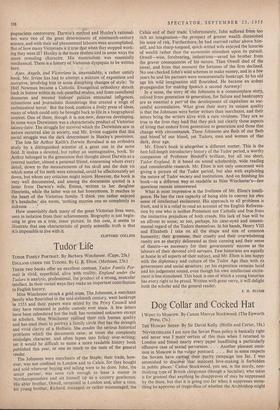Tudor Life
THESE two books offer an excellent contrast. Tudor Family Por- trait is vivid, superficial, alive with reality; England under the Tudors is analytic, professional, the product of a strong, muscular intellect. In their varied ways they make an important contribution to English history.
Miss Winchester struck a gold mine. The Johnsons, a merchant family who flourished in the mid-sixteenth century, went bankrupt in 1553 and their papers were seized by the Privy Council and they have remained in public custody ever since. A few letters have been calendared but the bulk has remained unknown except to scholars. Miss Winchester realised their rich human quality and has used them to portray a family circle that has the strength and vivid clarity of a Holbein. She evades the serious historical problems which the documents raise; at times she completely misjudges character, and often lapses into folksy over-writing; yet it would be difficult to name a more readable history book published this year, or one so much to the taste of the general reader.
The Johnsons were merchants of the Staple; their trade, how- ever, was not confined to London and to Calais, for they bought and sold wherever buying and selling were to be done. John, the senior partner, was soon rich enough to lease a manor in Northamptonshire and set himself up as a country gentleman. His abler brother, Otwell, remained in London and, after a time, his young brother, Richard, managed, or rather mismanaged, the Calais end of their trade. Unfortunately, John suffered from too rich an imagination—the prospect of greater wealth diminished his sense of risk. Furthermore, he had married rather above him- self, and his sharp-tongued, quick-witted wife enjoyed the luxuries of wealth rather than the economies attendant upon its pursuit. Otwell—wise, forebearing, industrious—saved his brother from the graver consequences of his nature. Then Otwell died of the sweat, and from that moment the fortunes of the firm declined. No one checked John's wild schemes to make money, and in a few years he and his partners were monumentally bankrupt. In his old age his wild imagination still flourished. He became an ardent propagandist for making Ipswich a second Antwerp!
In a sense, the story of the Johnsons is a commonplace story, relived from generation to generation, for failure and bankruptcy are as essential a part of the development of capitalism as suc- cessful accumulation. What gives their story its unique quality is that the Johnsons were better writers than merchants, and their letters bring the writers alive with a rare vividness. They are so true to the lives they lead that they pick out clearly those aspects of living that endure from generation to generation and those that change with circumstance. These Johnsons are flesh of our flesh and blood 'of our blood, yet Tudors, men and women of that dark, dour age.
Mr. Elton's book is altogether a different matter. This is the best full-length introductory history of the Tudor period, a worthy companion of Professor Bindoff's brilliant, but all too short, Tudor England. It is based on sound scholarship, wide reading and considerable research. Mr. Elton is not only concerned with giving a picture of the Tudor period, but also with explaining the nature of Tudor society and institutions. And on finishing his book—in a different way as readable as Miss Winchester's—few questions remain unanswered.
What is most impressive is the liveliness of Mr. Elton's intelli- gence. He has the rare capacity of being able to convey his o'wn sense of intellectual excitement. His approach to all problems is fresh, and it is a relief to read an account of the English Reforma- tion by one who is neither Protestant nor Catholic and free from the instinctive prejudices of both creeds. His lack of bias will be an affront to some; so too, perhaps, his clear-eyed and unsenti- mental regard of the Tudors themselves. In his hands, Henry VIII and Elizabeth I take on all the shape and size of common humanity; their grossness, their cruelty and their overwhelming vanity are as sharply delineated as their cunning and their sense of theatre—as necessary for their governments' success as the labours of their devoted civil servants. Few historians are equally at home in all aspects of their subject, and Mr. Elton is less happy with the diplomacy and culture of the Tudor Age than with its government and social structure; yet his exposition remains lucid and his judgement sound, even though his own intellectual excite- ment is less stimulated. This book is one of which a young historian has every right to be proud. Written with great verve, it will delight both the scholar and the general reader.
I. H. PLUMB
































 Previous page
Previous page